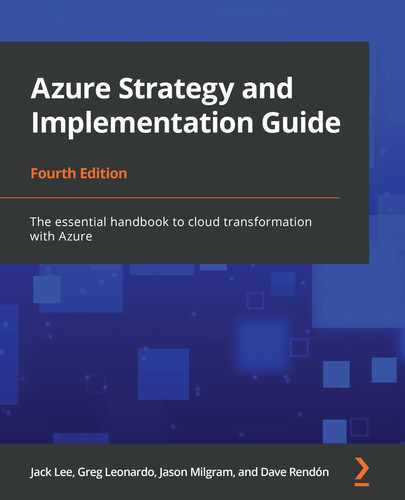Leverage Azure's cloud capabilities to find the most optimized path to meet your firm's cloud infrastructure needs Microsoft Azure is a powerful cloud computing platform that offers a multitude of services and capabilities for organizations of any size moving to a cloud strategy. This fourth edition comes with the latest updates on cloud security fundamentals, hybrid cloud, cloud migration, Microsoft Azure Active Directory, and Windows Virtual Desktop. It encapsulates the entire spectrum of measures involved in Azure deployment that includes understanding Azure fundamentals, choosing a suitable cloud architecture, building on design principles, becoming familiar with Azure DevOps, and learning best practices for optimization and management. The book begins by introducing you to the Azure cloud platform and demonstrating the substantial scope of digital transformation and innovation that can be achieved with Azure's capabilities. The guide also acquaints you with practical insights into application modernization, Azure Infrastructure as a Service (IaaS) deployment, infrastructure management, key application architectures, best practices of Azure DevOps, and Azure automation. By the end of this book, you will have acquired the skills required to drive Azure operations from the planning and cloud migration stage to cost management and troubleshooting. This book is designed to benefit Azure architects, cloud solution architects, Azure developers, Azure administrators, and anyone who wants to develop expertise in operating and administering the Azure cloud. Basic familiarity with operating systems and databases will help you grasp the concepts covered in this book.Key Features
Book Description
What you will learn
Who this book is for
Table of Contents
- Azure Strategy and Implementation Guide, Fourth Edition
- Preface
- 1. Introduction
- 2. Automation and governance in Azure
- 3. Modernizing with hybrid cloud and multicloud
- What is hybrid cloud, multicloud, and edge computing?
- What makes a hybrid and multicloud strategy successful?
- Azure Arc overview
- Kubernetes app management at scale
- Azure Arc enabled servers
- Azure Arc enabled data services
- Prerequisites for Azure data services
- Connectivity modes
- Connectivity requirements
- Azure Arc data controller creation
- Azure Arc in GitHub
- Modernizing your datacenter with Azure Stack
- Azure Stack Hub overview
- Use cases for Azure Stack Hub
- Azure Stack Hub architecture
- Azure Stack Hub identity provider
- How is Azure Stack Hub managed?
- Resource providers
- Azure Stack Hub administration basics
- Getting support
- Azure Stack Development Kit
- Azure Stack Hub update management
- Azure Stack HCI solution overview
- Azure Stack HCI use cases
- Azure integration benefits
- Azure Stack HCI prerequisites
- Hardware partners
- Software partners
- Licensing, billing, and pricing
- Management tools
- Getting started with Azure Stack HCI and Windows Admin Center
- Installing Windows Admin Center
- Adding and connecting to an Azure Stack HCI cluster
- Comparing Azure Stack Hub and Azure Stack HCI
- Summary
- 4. Cloud migration: Planning, implementation, and best practices
- Microsoft Azure Well-Architected Framework
- Choosing your underlying infrastructure
- Compute
- Networking
- Storage
- Workload migration scenarios
- Windows Server and Linux workloads
- SQL Server
- Containers
- VMware workloads
- SAP workloads
- High-performance computing
- Achieving cloud scale and maximizing performance
- Azure autoscaling
- Compute and storage performance considerations
- Enterprise-grade backup and disaster recovery
- Azure Backup
- Azure Site Recovery
- Azure migration best practices and support
- The official Azure documentation
- Azure Migrate
- Azure Migration Program
- Azure Architecture Center
- Azure App Service
- Azure SQL Database
- Free training with Microsoft Learn
- Contact an Azure sales specialist
- Summary
- 5. Enabling secure, remote work with Microsoft Azure AD and WVD
- The fundamentals of deploying remote work infrastructure
- Azure Active Directory
- Plan your environment
- Configuring Azure AD and hybrid environments
- Secure your identity infrastructure
- Enabling remote connectivity
- Azure Virtual WAN
- Azure VPN
- Securing and managing traffic to your workloads
- Application Gateway with WAF
- Azure Firewall
- Azure Load Balancer and cross-region load balancing
- Azure Bastion and Just-in-Time (JIT) access
- Enabling remote work with Windows Virtual Desktop
- Network guidelines
- Managing user profiles with Azure Files and NetApp Files
- Azure Monitor for Windows Virtual Desktop
- Windows Virtual Desktop partner integrations
- Summary
- 6. Security fundamentals to help protect against cybercrime
- Enabling security for remote workers
- Security operations excellence
- Cyber Defense Operations Center
- Protect
- Detect
- Respond
- Microsoft Intelligent Security Association
- Gain visibility into your entire infrastructure with Azure Security Center
- Security posture management and multicloud
- Azure Security Center architecture
- Azure Security Benchmark
- Achieve advanced threat protection for your hybrid and multicloud environments with Azure Defender
- Azure Defender dashboard
- Best practices for securing your network
- Modernize your security operations with Azure Sentinel, a cloud-native SIEM
- A unified SecOps experience
- Summary
- 7. Offers, support, resources, and tips to optimize cost in Azure
- 8. Conclusion
- Index
